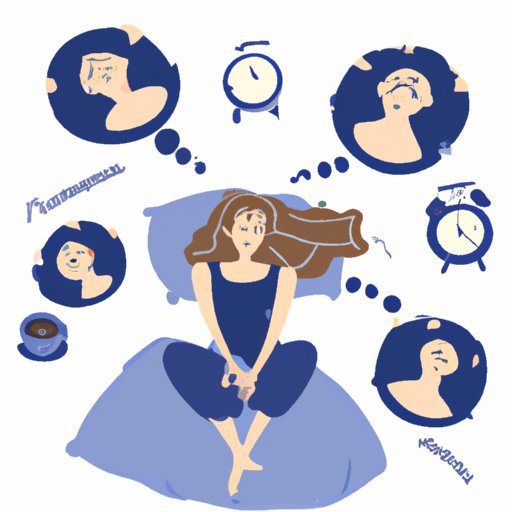
Introduction
Insomnia is a common sleep disorder that affects millions of people worldwide. It is a condition where a person has trouble falling asleep, staying asleep, or both. Insomnia can have a significant impact on your physical and mental health, and understanding how to identify it is essential. This article will provide you with a guide to identifying sleeplessness, its effects, and how to cope with it.
The Signs and Symptoms of Insomnia: A Guide to Identifying Sleeplessness
Insomnia is a condition characterized by difficulty falling or staying asleep. While everyone experiences occasional nights of poor sleep, insomnia is diagnosed when the problem persists for a month or more. There are two main types of insomnia: acute and chronic. Acute insomnia is short-term and is usually brought on by stress or a change in sleep routine. Chronic insomnia is long-term and can be caused by underlying medical or psychiatric conditions.
Common signs and symptoms of insomnia include difficulty falling asleep, waking up too early, waking up frequently during the night, feeling tired or groggy during the day, mood changes, and difficulty focusing. These symptoms can manifest differently in different people. For example, one person may struggle with falling asleep, while another experiences waking up at night. If you experience any of these symptoms regularly, it may indicate that you have insomnia.
Do You Have Insomnia? 5 Questions to Consider
If you suspect you have insomnia, there are some questions you can ask yourself to confirm your symptoms. These questions can help you determine how frequently the symptoms occur, how long they last, and how disruptive they are to your life. For example:
- Do you have difficulty falling asleep at least three times a week?
- Do you wake up too early at least three times a week?
- Do you wake up during the night and have difficulty falling back asleep at least three times a week?
- Does your sleep problem impact your daily life?
- Have you been experiencing these symptoms for more than a month?
If you answer yes to any of these questions, it may indicate that you have insomnia. It is important to seek medical guidance if you suspect you have insomnia or another sleep disorder. A medical professional can help identify the underlying causes of your sleep problem and recommend treatments that will work best for you.
The Insomniac’s Conundrum: Understanding the Causes and Effects
Insomnia can be caused by a range of factors, including stress, anxiety, depression, certain medications, and medical conditions such as sleep apnea. In some cases, there may be no apparent cause. Insomnia can also lead to other health problems, both physical and mental.
Studies have shown that insomnia can increase the risk of accidents, impair cognitive function, decrease productivity, and decrease immunity. It can also exacerbate existing mental health conditions such as anxiety and depression. Insomnia can have a significant impact on your overall well-being and quality of life.
How to Spot Insomnia in Yourself: A Step-by-Step Guide
If you suspect you have insomnia, there are steps you can take to confirm your symptoms. Keeping a sleep diary can help you track when you go to bed, how long it takes to fall asleep, how long you stay asleep, and how tired you feel during the day. Tracking your symptoms can help you determine if you have a pattern of poor sleep.
It is also important to create healthy sleep habits. Regulating your sleep schedule, minimizing caffeine and alcohol consumption, establishing a relaxing bedtime routine, and creating a comfortable sleep environment can all contribute to better sleep quality.
If you continue to experience sleep problems, it is essential to seek medical advice. A medical professional can help identify the underlying causes of your sleep problem and recommend treatments that will work best for you.
The Hidden Dangers of Insomnia: What You Need to Know
The negative consequences of untreated insomnia can be severe. In addition to the risk of accidents and decreased productivity, long-term insomnia can lead to chronic health conditions such as heart disease, diabetes, and obesity. It can also exacerbate existing mental health conditions and lead to substance abuse. Seeking treatment is essential for your overall health and well-being.
When Sleep Won’t Come: Tips for Coping with Insomnia
There are several coping mechanisms for managing insomnia, including relaxation techniques, cognitive-behavioral therapy, medication, and lifestyle changes. Relaxation techniques such as deep breathing, progressive muscle relaxation, and visualization can help calm the mind and body before bedtime.
Cognitive-behavioral therapy can help identify harmful thought patterns and behaviors related to sleep and provide strategies for managing them. Medications such as sleeping pills can be effective in the short term but generally should not be used long-term. Lifestyle changes such as reducing screen time before bed, establishing a regular sleep schedule, and creating a comfortable sleep environment can all contribute to better sleep quality.
Conclusion
Insomnia is a common sleep disorder that can have a significant impact on your physical and mental health. If you suspect you have insomnia or another sleep disorder, it is important to seek medical guidance. Keeping a sleep diary, creating healthy sleep habits, and seeking treatment can all contribute to better sleep quality and overall well-being. Don’t let sleeplessness impact your life – take action today.




